Written by Ishita Sengupta |Kolkata |Updated: December 16, 2018 10:49:32 am
Booksellers of College Street: Between tiny shops and greasy palms, an untold story
College Street, a kilometre-long stretch of road from Ganesh Chandra Avenue Crossing in Bowbazar to Mahatma Gandhi Road is lined with books on both sides; the eclectic collection on display good can entice any connoisseur of books.
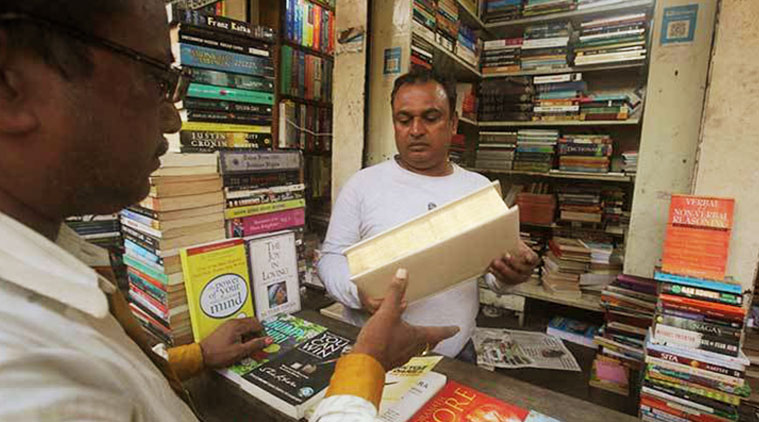
Nirmal Bandhopadhyay goes to College Street every single day. “There are days when I don’t buy a single book,” the 55-year-old teacher says conspiratorially, unravelling his addiction for the headiness of Kolkata’s neighbourhood of books. “Just flipping through the pages has become an addiction.”
Bandopadhyay’s obsession for books and love for the place prevented him for leaving the city. It also stopped him from taking up another job that threatened with such a possibility. “Leaving this place would have ruined me,” he adds, visibly shuddering at the possibility.
A street made of books
A kilometre-long stretch of road from Ganesh Chandra Avenue Crossing in Bowbazar to Mahatma Gandhi Road is lined with books on both sides; the eclectic collection on display good can entice any connoisseur of books. A hardcover of Baywatch can be found placed neatly next to a book on Swami Vivekananda’s selected lectures. They might even come for the same price. College Street, one of the largest second-hand selling markets in India, has an indubitable surreal charm to it. Known as Boi Para in Bengali, it is a world in itself that functions by its own set of rules. There is nothing pious or profane, nothing too old or new.
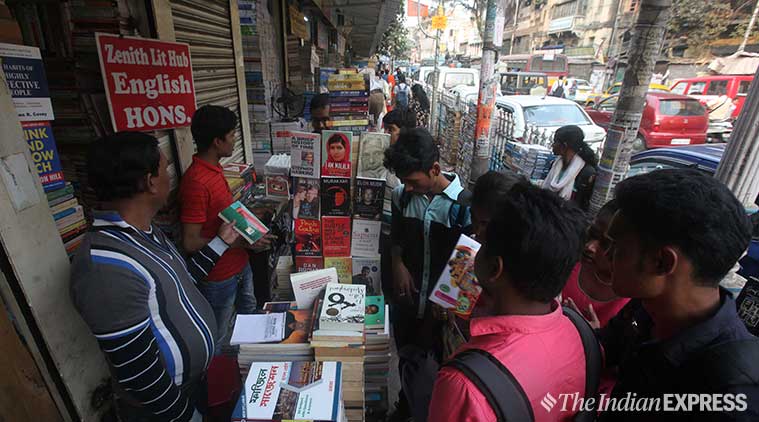
The singularity of it might tempt one to compare it with the erstwhile Macondo, Marquez had written about in One Hundred Years Of Solitude, a city where strange things happen and stranger people reside. But it perhaps comes closest to the land of Gup, Salman Rushdie mentions in Haroun and The Sea of Stories, a place where stories are churned out, a place where stories are retained. The booksellers of College Street— who stop by those walking on the road with the promise of getting them the book they want, assuming always that it is a book that they want, assuming too that there could be no other purpose of visiting the place otherwise — are the ones maintaining the stories here. They refer to authors with their first name, as if they are talking about some distant cousin they know all about. Well, they do.
Businessmen of the footpath
No one seems to know the name of stall number 22’s owner. Ranjini Mondal, 21, who had come to buy books on a Friday evening, calls him PT Kaku. His fellow booksellers refer to him simply as PT as they come to his stall asking for books they don’t have or dump a pile of books on his makeshift wooden table. Sorit Mallick, who has been selling books at College Street for over two decades now, responds to the moniker as if it had always been his name.
“I have books on Sartre, Camus, Beauvoir, several art books on Klimt, Picasso, even some rare books procured from different libraries,” says the 49-year-old who started started selling second-hand books soon after completing his graduation in Political Science from Sovaranai Memorial College.
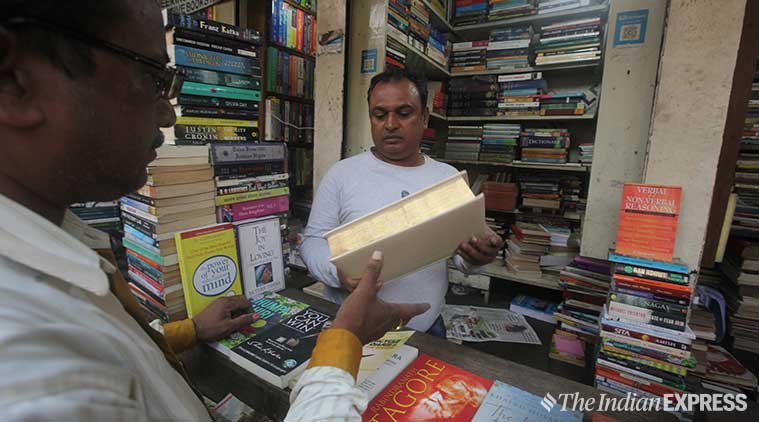
The stall might look like it has room only for one, but Mallick says it has over 3,000 books. There are some on the table, there is a pile near his foot, some above him, and some placed next to him, making it seem like the place was built by books and not for them.
Stall number 22 is not an exception. Placed next to each other without a gap, all the stalls approximately share a uniform shape and size.
Mansoor Alam’s forefathers have sold books at Boi Para long before there were any stalls. A regular here, Alam says previously books would be tied with a thread to the walls of the then Presidency College and sold. “My family has been involved in this for 136 years.” His stall is laden with books, ranging from history and archaeology to mythology and photography. “There are 4,500 books in here,” he says, adding that his movements have been restricted due to them. “I don’t move my hands much when I stand here. The books might just all fall,” he says.
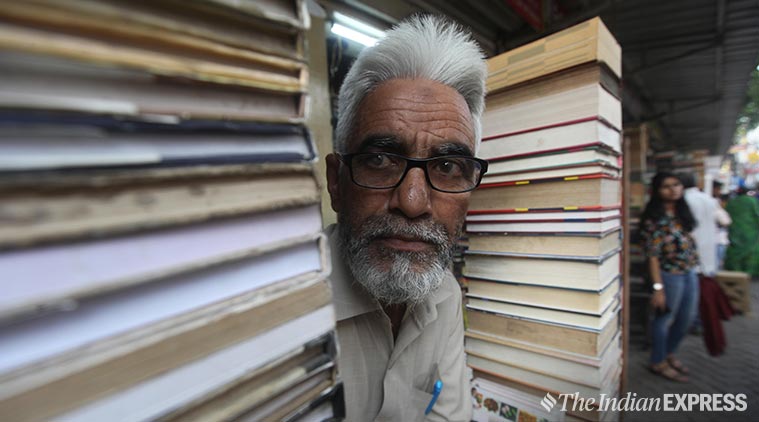
Books often spill on to the road, something the booksellers do not mind. “We are the businessmen of the footpath. Our hands are always dirty,” Mallick says, showing no semblance of disgust at his perpetually dirty hands. He remembers to carefully clean it though before holding a book.
Space, it seems, is not much of a concern here. In fact, they share a charming indifference towards it by naming their stalls “Book Mahal” and “Boi Palace”. The look on their faces and the way they treat books tell you there is no irony here, and no hyperbole. They really do mean it. These stalls are their palaces and they would rather be here than anywhere else.
‘Ki boi chai, bolun?’
The air around College Street is thick with jaded persuasions — some found between the pages of second-hand books, others uttered by the booksellers. And though their generic, “Ki boi chai, bolun, shob achey” (“What book do you want? We have everything”) might seem like a tall claim, it is often not the case. “College Street is a treasure trove,” Bandopadhyay says, whose recent visit turned out to be more rewarding that he had anticipated. The middle-aged man could hardly suppress his glee as he held two books — The Essential Mystery, Major Filmmakers of Indian Art Cinema by John H Wood and In Search Of The Lost Chord by Danny Goldberg in his hands. “I did not know there was a second edition of this book,” he says pointing at Hood’s book. “This is golden.”
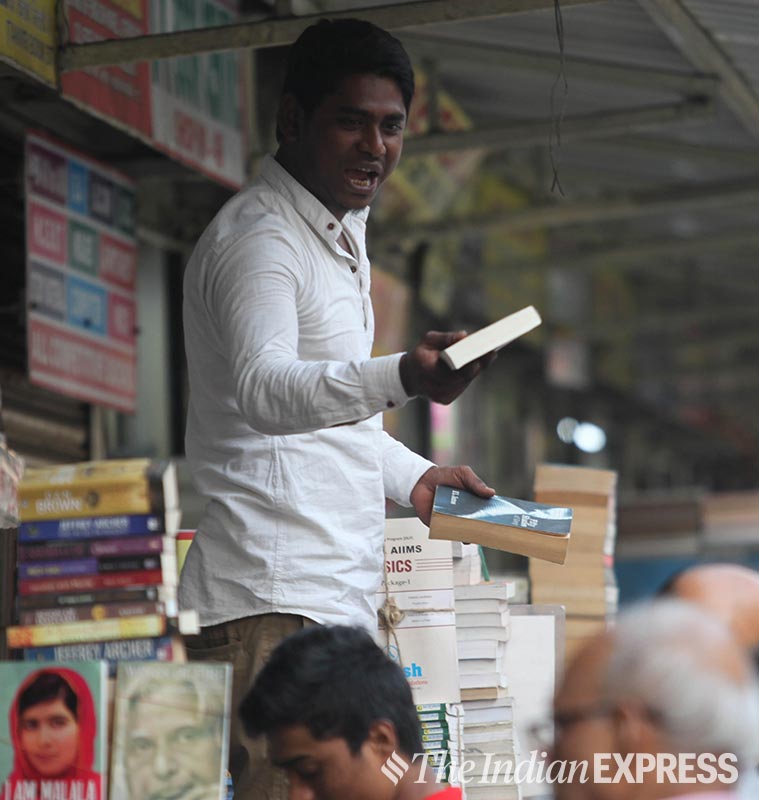
Both Mallick and Alam take sufficient pride in their collection. Mallick has photocopies of rare academic books. He recollects selling a second-hand book on tea leaves for Rs 500 even though he had asked for Rs 200. “The customer was so happy to get the book that he refused to buy it for Rs 200,” he says.
Mallick also takes much gratification in the knowledge that he has never failed to arrange for a book, as and when there has been a need. In his 25 years at College Street, he regards getting his hands on Salman Rushdie’s banned Satanic Verses as a highlight. “Not once, but thrice,” he says, as if reminding himself of past victories.
Alam, on the other hand, is certain that he has books that one will not find anywhere else. His words ring true as one spots photo books by both Raghu Rai and Henri Cartier-Bresson in his stall. Kept far away from one another — as if the photographers were having a feud — the prices, Alam says, vary. Some pay more for Rai then they do for Bresson and years of experience have taught him to understand which reader wants which book and how badly. Experience has also taught them to gauge the worth of a book, to know instinctively which one will sell and which won’t, to know who is Camus and who isn’t.
‘Camus, who?’
“I had no idea who Christie, Coetzee were or even Marquez,” Md Sajid says, as he arranges the first line of books at his stall. All happen to be written by these authors. It was also at his stall that Bandopadhyay had chanced upon the “treasure” of the evening.
Samir Kumar Acharya, an employee at Food Corporation of India, and a College Street regular since 1981, has seen much change. But stopping by Sajid’s stall is a habit he has held on to. “It is still one of the few places that sells good books,” he says.

Sajid, a Commerce graduate, bashfully admits that he had no idea what he was selling in the beginning. “I took up the job because my elder brother used to sell book. But I had no idea about the authors. I did not know Camus or Sartre. I had bought their books by chance and they sold like hot cakes.” Sajid also recollects, with endearing nonchalance, how he would pronounce the name of American writer William S Burroughs wrong. “I would call him Booroughs,” he says. The name now sits comfortably on his tongue.
Much has changed in the 11 years. The 40-year-old now not only knows how to pronounce authors’ names, but also what and how they write. And he credits the readers for it. “Whatever little I have learnt, I have learnt from the customers, even how to pronounce Burroughs.”
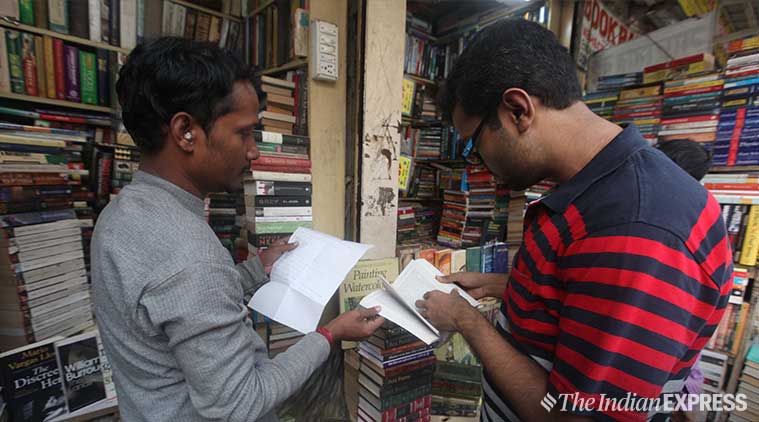
Mallick is of a similar opinion. The first one from his family to be in this business, Mallick remembers being scared when readers would come and ask for books by different authors. “I had gone to my mother and told her I will not be able to continue it,” he says. But there was a change of heart, soon. “I thought if others are doing it, some who are even less educated than me, then why not me?” he asks, rhetorically.
Sheikh Oheed, started helping his uncle sell books at College Street 40 years ago. While selling Haruki Murakami’s Kafka on the Shore to a young girl on a Tuesday evening, Oheed shares how difficult it used to be for him to understand which authors the readers were talking about, or what books they wanted. “Several times I sold a book for much less than I should have.”

Not understanding the reader’s choice is no longer a problem now. “I have learnt on the job.”
Returning the favour
In College Street, nobody really takes a favour without returning one. Readers, who have benefited much from buying books from the stalls, have also, more often than not, contributed to the collection by selling some of their old books. A book by James Baldwin has been traded for a work by Barnes many a times. In an almost similar way, booksellers, who have gained much from the wisdom of the readers, do not hesitate in doling out advices, if and when need be.
Sajid might not be much of a reader, but that does not stop him from suggesting books to some of those who stop by at his stall.
“A couple of years back, very few people used to read James Patterson. If I sensed that they would enjoy his writing, I would recommend. I did the same for Lee Child and there have been so many who have come back and bought books by these authors regularly after that,” he says.

Mallick admits how often he goes out of his way to give students something other than the easily available Norton critical notes for their texts. “If everybody writes the same answer, how will they score more?” he asks, with much concern in his voice.
College Street changes your life
“College Street changed my life,” Bandopadhyay says, looking at Sajid with much gratitude.
College Street — trading in stories and almost contorting itself to make place for some more books — is more ancient than the people who visit here. It perhaps dates back further than most of the books sold here were written.
But the place seems not a day older than the booksellers who rehash and modulate their war cry every morning. Their greasy palms that they no longer mind, and the fatigued eyes that light up every time they see a book, make it seem like they co-existed with the place since its inception. They have aged with the place, braved storms together. They make the place that is College Street, as much as the place makes them who they are.










.png)











No hay comentarios:
Publicar un comentario